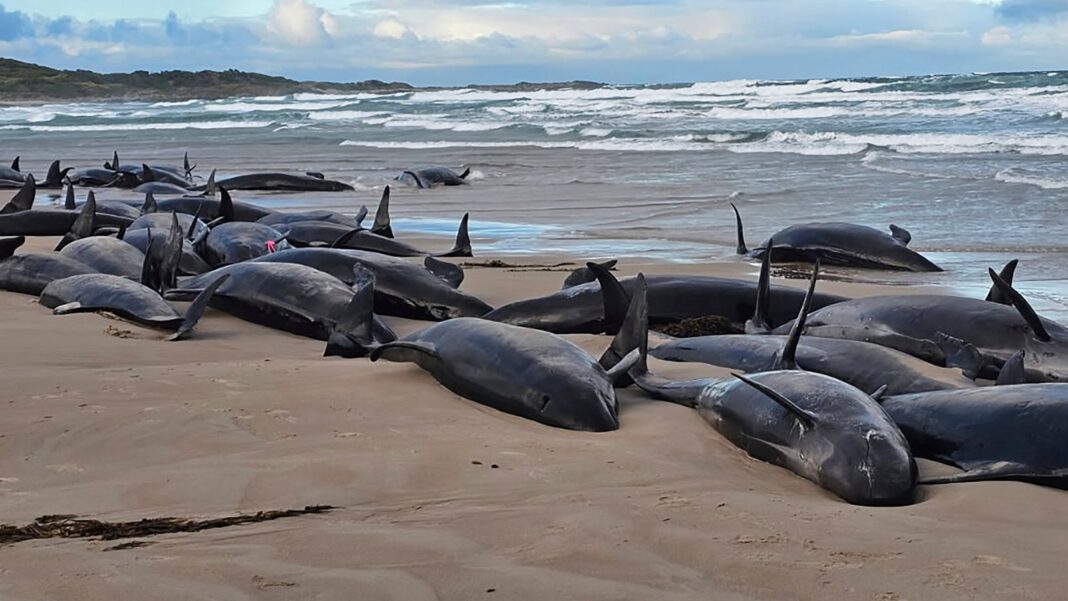Australia has begun euthanising the false killer whales stranded on a remote beach in Tasmania.
Authorities said they had begun putting down the animals after bad weather and the isolated location hampered efforts to refloat them.
Earlier this week, 157 whales were found beached near Arthur River on the island.
Despite the best efforts of authorities, they were unable to refloat any of the animals – which can weigh anywhere between 500kg and 3,000kg.
A total of 27 animals were euthanised on Thursday morning, with 38 still alive, an official said.
The false killer whales stranded on the beach.
Pic: AP/NRE
The chances of beached whales surviving are low, as their bodies are crushed by their own weight when outside water and attempts to return them to sea can be dangerous for the rescuers involved.
Shelley Graham, Department of Natural Resources and Environment (DNRE) incident controller, said the decision had been taken “for animal welfare reasons”.
She added that two whales they had tried to refloat were simply washed back ashore
Deputy incident controller Dr Kris Carlyon previously described euthanasia as a “last resort” but said the “longer these animals are out stranded, the longer they are suffering – all alternative options have been unsuccessful”.
It is the third mass stranding in the last five years on the west coast of the island.
This content is provided by Datawrapper, which may be using cookies and other technologies.
To show you this content, we need your permission to use cookies.
You can use the buttons below to amend your preferences to enable Datawrapper cookies or to allow those cookies just once.
You can change your settings at any time via the Privacy Options.
Unfortunately we have been unable to verify if you have consented to Datawrapper cookies.
To view this content you can use the button below to allow Datawrapper cookies for this session only.

Pic: AP/NRE
Authorities said they would examine the remains of the whales for any clues as to what caused the mass stranding incident.
Dr Angus Henderson from Tasmania University said there are many “natural causes”, such as lead animals getting ill, lost or disoriented, the weather or “magnetic anomalies”.
Underwater noise from human activities like seismic testing and military exercises could also play a part, he said.

Pic: AP/Jocelyn Flint
Dr Vanessa Pirotta from Macquarie University said Tasmania is a “hotspot” for such mass strandings.
“Perhaps it’s the geographical location, which make it difficult to navigate around. This is just one of many theories that may help understand why this happens.”
The whales were discovered on Tuesday afternoon, but by Wednesday some could have been stranded for as long as 48 hours.
Read more from Sky News:
Delta jet crash passengers offered money by airline
Zelenskyy is fighting a war on two fronts
Odds of asteroid hitting Earth rise again
Arthur River local resident Jocelyn Flint said her son had discovered the stranded whales around midnight, while fishing for sharks.
She said she had visited the scene.
“The water was surging right up and they were thrashing. They’re just dying, they’ve sunk down in the sand. I think it’s too late,” she said.
She added: “There are little babies. Up one end, there’s a lot of big ones. It’s sad.”







